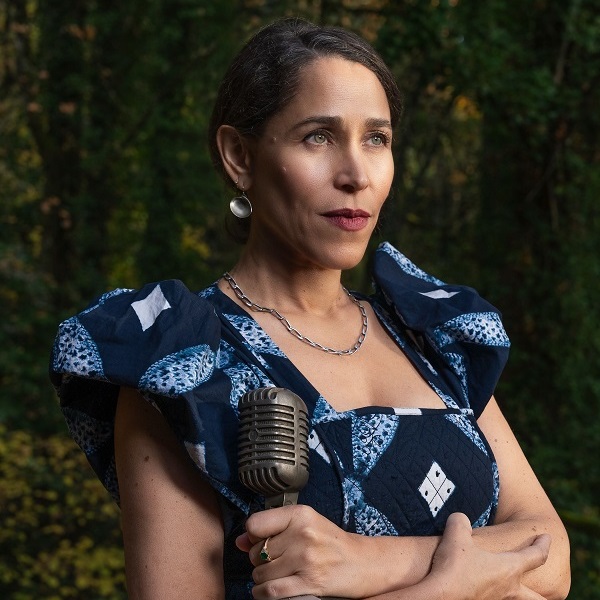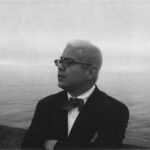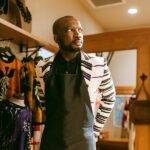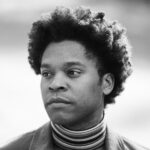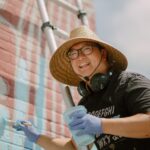27 Languages, 29 Years, and 6 Months with China Forbes
Written by Bruce Poinsette; Photographed by Jessica Smith
27 Languages
As the lead vocalist of Pink Martini, China Forbes is on the road six months of the year. Over twenty-nine years, she has built a reputation for her captivating stage presence and ability to perform in twenty-seven different languages. As of 2024, that list includes English, French, Italian, Neapolitan, Spanish, Portuguese, Czech, Croatian, Dutch, German, Hungarian, Greek, Turkish, Arabic, Farsi, Hebrew, Laddino, Japanese, Chinese, Korean, Vietnamese, Thai, Romanian, Russian, Uzbek, Xhosa, and Latin.
“When I sing French, or any language, I find that if I pretend as if I’ve had two glasses of champagne, and I feel sort of uninhibited and a little slurry, it sounds much more authentic,” says Forbes. “Most people tend to over-enunciate and emphasize each word and it sounds awkward and foreign.”
A trained actor, Forbes uses her theater background to embody the characters in her songs. This, along with language, allows her to not just communicate songs to a multitude of audiences, but to genuinely connect with them.
“We learned a Korean song when [Pink Martini] went to Seoul, and we were thrilled that the young fans were squealing,” Forbes says. “That reaction is exactly the connection we hope to make with our fans.” And she has opinions about venues. “It always helps if we’re in a club where people can stand and dance, and they’re right at the foot of the stage looking up at you with bright faces, singing along—those are the best shows.”
Sometimes it doesn’t go smoothly. Forbes recalls a concert in Damascus, Syria, where she not only stumbled but completely blanked on her Arabic lyrics. However, instead of turning on her, the crowd appreciated that she had tried. After that show, she says she no longer fears making mistakes.
In France, fans unexpectedly encouraged her not to improve her accent. “Don’t get better. We like your accent. It’s so cute,” she recalls. “That was so fun to figure out because it just freed me up. It turns out people won’t begrudge me a mistake or a mispronunciation when I’m making an effort to sing in their language.”
Closer to home, in September 2022, the Patricia Reser Center for the Arts hosted a series of shows featuring Pink Martini. Though the Reser opened in March of that year, Executive Director Chris Ayzoukian considers that autumn evening the Center’s true debut.
“Your venue is not considered open until Pink Martini plays it,” says Ayzoukian.
That same year, Forbes received the Ella Fitzgerald Award from the Montreal International Jazz Festival. “It was so startling,” says Forbes. “How am I getting this? This is crazy.” But her followers were not surprised.
“It’s no wonder Pink Martini has a huge fan base not just in Oregon and the Northwest, but all over the world,” says Ayzoukian. “China in particular I think is one of the greatest vocalists and songstresses of our time.”
29 Years
Continue Reading
In 1995, Forbes’ former Harvard classmate and Pink Martini founder Thomas Lauderdale invited her to Portland to perform with the group. She was pursuing acting and performing with her own band in New York at the time, but Lauderdale persuaded her to fly across the country to sing for a weekend. Having grown up in Cambridge, Massachusetts, in the ‘70s, she found a familiar, cozy, quirky, bohemian atmosphere in ‘90s Portland.
Shortly after, Forbes was invited to perform at France’s Cannes Film Festival in conjunction with her role in the film Franchesca Page. Lauderdale asked to tag along as her accompanist and the two realized how well Pink Martini’s international repertoire would translate there. Pink Martini performed at the festival the following year, and their career in France was launched. Their first song, “Sympathique,” co-written by Forbes and Lauderdale, was nominated for song of the year at Les Victoires de la Musique (the French Grammys) and is a favorite of striking French workers to this day for the mantra “Je ne veux pas travailler,” which translates to “I don’t want to work.”
Three years and many frequent flyer miles later, Forbes relocated from New York to Portland. She reminisces fondly about those early days, the “awesome food days” when she got to know chefs, musicians, restaurateurs, and Lauderdale’s immense, diverse friend group across the city. Lauderdale originally created Pink Martini in response to music at fundraisers being “underwhelming, lackluster, loud, and un-neighborly.” Over the years, they have become beloved for their willingness to support activism and organizations dedicated to issues such as civil rights, education, affordable housing, and climate change.
Though the band’s songs appear in numerous films and TV shows, Forbes notes that Pink Martini has never had a big label or major agency behind them. The band distributes their music through independently owned Heinz Records, named after Lauderdale’s dog.
“I always feel like we exist outside the music business—the real music business,” says Forbes. “But it has weirdly worked.”
6 Months
Forbes’ home sits along a narrow two-lane road, tucked away in the forests of southwest Portland. Her living room wall explodes with art, including her grandmother’s oil paintings and lithographs of boats to represent her father’s love of sailing.
Here, China Forbes’ outgoing stage persona with Pink Martini stands in contrast to China Forbes, the person.
“Surrounding myself with family photos stirs that nostalgic kernel in me that makes me want to write because it gets me to that sad place,” says Forbes. “I think happy is too singular, a joyful emotion. Whereas sadness is many things. It’s memory. It’s loss. All of that churns you into a place where you’re more poetic and it’s not so straightforward. For me, it’s so hard to write a happy song.”
Meanwhile, her lyrics come from everyday observations. “When I’m walking around, I kind of trap things that most people wouldn’t notice that might just go by,” says Forbes. “I hear the poetry in them and I jot down lyrics according to how I’m feeling about that phrase. And later, I create a melody for it.”
Forbes’ living room studio features album covers of Ella Fitzgerald, Donna Summer, and Madonna, as well as a red neon light that spells her name. The studio houses instruments Forbes has taught herself to play over the years—another kind of fluency—including guitars, two basses, ukuleles and a Steinway baby grand piano.
In contrast to her early years, these days Forbes describes herself as slightly hermitic. Being on the road six months of the year, she cherishes her family time, and being at home. “My son is fifteen now and I don’t want to miss his entire childhood,” says Forbes.
While Forbes often writes about her personal life, her recent album release, The Road, is her first solo project since she became a mother, touring constantly and missing time with her son. On The Road, she’s leaning into that maternal ache in the songs “I Went to LA” and “Beautiful World.”
A decade in the making, the album’s journey included a few studios, a couple of producers, a divorce, COVID, and the death of a beloved bandmate.
“It’s like a mid-life crisis, divorce, motherhood, mental illness, hope album,” says Forbes, who ultimately produced the album herself. “I want people to hear these songs and to feel okay about struggling, and feel okay about getting older, and feel okay about who they are at different points in their life. You’ve just got to keep going, and changing, and starting over. I could have used an album like that.”

